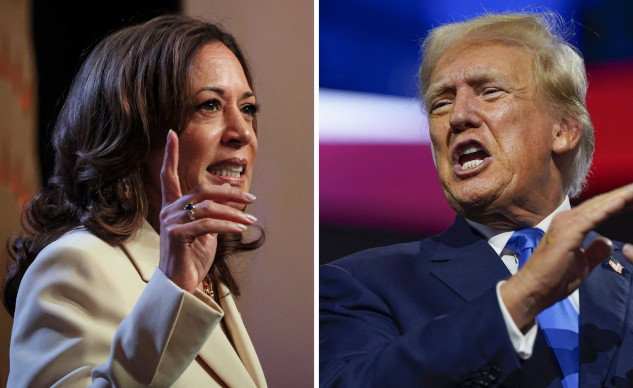
In This Article:
- How does the 2024 election present a business decision?
- Why is Biden-Harris's economic performance envied globally?
- Is Trump's economic policy a threat to inflation control and job creation?
- What are the risks of Trump's tariffs and energy policy?
- Will deporting millions of workers harm the U.S. economy?
- Which path offers sustainable growth: Biden-Harris or Trump?
2024 Business Decision Vote: Harris or Trump?
by Robert Jennings, Innerself.com
As we approach the 2024 presidential election, some voters grapple with a profound decision: Do we continue down the path laid out by the Biden-Harris administration, or do we revert to the policies championed by Donald Trump? For many, this choice is framed as a business decision, a term used by those prioritizing economic performance and fiscal responsibility above all else. But what does this mean? Is it about inflation, deficits, or the overall strength of the economy? And how should we evaluate the competing claims of both candidates?
The upcoming election brings crucial economic issues to the forefront, with varying perspectives from experts, business leaders, and everyday voters. On one side, the U.S. economy has shown remarkable performance under the Biden-Harris administration, achieving growth that surpasses many expectations. This success should reassure voters about the current economic direction. Conversely, concerns about Trump's proposed economic policies raise red flags, with Nobel-winning economists and industry experts highlighting significant risks. Understanding what's at stake goes beyond political talking points—it requires a close examination of how these policies affect jobs, inflation, and the financial stability of American households.
The Myth of the "Business Decision"
Economic issues have dominated U.S. elections for decades, often framed as a 'business decision' for voters. In the context of the 2024 election, a 'business decision' refers to a voter's choice based on financial considerations such as job creation, inflation control, and fiscal responsibility. This framing has become especially prevalent when discussing Donald Trump, with supporters often defending their choice by emphasizing his supposed economic savvy despite his controversial actions and rhetoric.
Yet, as Rachel Maddow pointed out in a recent segment, this so-called business-minded approach may not hold up under scrutiny. At the end of the Biden-Harris administration, the U.S. economy is hailed as the 'envy of the world.' This is due to a combination of factors, including robust job growth, a significant reduction in unemployment rates, and a strong GDP growth. The Economist, one of the most respected publications in global finance, has published a special report praising the American economy, noting that it has outpaced other wealthy nations and left the record of the Trump administration in the dust.
This prompts a critical question for those still considering their vote a "business decision." Suppose the U.S. economy under Biden and Harris is outshining its global counterparts. Why would returning to Trump's policies be a better economic choice? The data suggests it wouldn't be. Under the current administration, the U.S. job market has achieved unprecedented success, with millions of new jobs added, wages increasing, and unemployment hitting historic lows. These are the metrics that business-minded voters typically prioritize, yet they seem to be overlooked in favor of Trump's more emotionally charged rhetoric about economic dominance and tax cuts.
Inflation and Deficits
Another critical factor for many voters who define themselves as fiscally conservative is inflation and the federal deficit. Again, the facts paint a clear picture: Biden and Harris have demonstrated more remarkable fiscal restraint than Trump, and the numbers back this up. The potential risks of Trump's policies should raise concerns about the future economic stability. The Wall Street Journal recently published a survey of economists, with a majority concluding that inflation, interest rates, and deficits would all rise faster under a second Trump administration than Harris.
One might ask, why is this the case? For starters, Trump's economic policies, particularly his approach to tariffs and trade, tend to have regressive effects. During his first term, Trump imposed massive tariffs on Chinese goods, claiming that China would bear the cost. However, as economists quickly pointed out, these tariffs function as taxes on American consumers, raising the prices of everyday goods. Trump's tariff policies added an estimated $2,500 annually to the average family's expenses.
Moreover, Trump's plans to increase corporate consolidation, particularly in industries like airlines and oil, would have severe inflationary consequences. Corporate consolidation reduces competition, allowing big companies to raise prices without fear of losing customers. This drives up costs for everyone, especially regarding essentials like fuel and travel. In contrast, Biden and Harris have pushed for antitrust measures that promote competition, keeping prices in check for ordinary Americans.
Energy Policy
Energy costs are another crucial area where the two candidates diverge dramatically. Under Biden and Harris, the U.S. has made significant strides toward energy efficiency and clean energy incentives. This has helped reduce carbon emissions and kept fuel prices stable by reducing reliance on fossil fuels. By contrast, Trump has promised to dismantle these initiatives, leading to higher fuel consumption, gas prices, and increased energy bills for American households.
Rachel Maddow's analysis touches on the Biden-Harris administration's energy policies, emphasizing their focus on long-term savings and environmental responsibility. This emphasis on long-term benefits should make the audience feel optimistic about the future. However, Trump's approach is far more short-sighted. By rolling back fuel efficiency standards and promoting oil industry mergers, Trump's policies would significantly increase fuel prices over time, burdening families and businesses.
The Deportation Plan: Economic Suicide
Perhaps one of the most alarming aspects of Trump's 2024 platform is his aggressive stance on immigration. Trump has pledged to carry out the most extensive deportation campaign in U.S. history, targeting millions of undocumented workers. While this may appeal to specific segments of his base, the economic ramifications are severe.
The U.S. economy relies heavily on undocumented labor, particularly agriculture, construction, and food service sectors. Deporting millions of workers would lead to massive labor shortages, driving up the costs of food, housing, and services. As Robert Reich explains in his recent commentary, this would have a catastrophic impact on prices across the board, further inflating the cost of living for everyone. Yet, Trump seems either unaware of or indifferent to these consequences, focusing instead on his hardline stance on immigration without considering its broader economic impact.
The Role of Business in Social Responsibility
For many voters, a "business decision" is purely about numbers—tax rates, job creation, and economic growth. However, an essential element of social responsibility comes into play when making a business decision on such a massive scale. Considering the upcoming election, weighing the immediate economic benefits and long-term societal consequences is critical.
Under Biden and Harris, a concerted effort has been made to address systemic inequality, promote environmental sustainability, and ensure economic growth benefits all Americans, not just the wealthy. Trump, on the other hand, has repeatedly demonstrated that his policies favor the rich and powerful at the expense of the working class. His tax cuts disproportionately benefit corporations and the top 1%. At the same time, his trade policies and immigration plans harm those who can least afford it.
The True Business Decision
At the heart of this election is a fundamental choice: Do we prioritize short-term economic gains for the wealthy, or do we choose a path that promotes sustainable growth, fiscal responsibility, and social equity? For those who claim to be making a "business decision" when voting, the facts suggest that Biden and Harris are the clear winners. Their track record on job creation, inflation control, and fiscal responsibility outshines Trump's by every measure.
As we approach Election Day, it's important to remember that every vote is a business decision—not just for our finances but for the future of our country. The policies we choose now will shape the economic landscape for future generations. Do we want an economy that works for everyone or favors the few at the expense of the many? The choice is yours.
In this video, Rachel Maddow breaks down the economic arguments for the 2024 election, focusing on how Trump's policies could negatively impact inflation, the deficit, and job creation. Maddow explores why business-minded voters should reconsider their support for Trump, given the strength of the current Biden-Harris economy, and she provides compelling data to back up her claims.
Article Recap:
The 2024 election asks voters to consider Biden-Harris economic performance versus Trump's promises. With Biden-Harris achieving notable growth in jobs, inflation control, and fiscal responsibility, experts question the wisdom of viewing Trump's return as a better "business decision." Economic policies, from tariffs to energy, present significant contrasts between the two candidates, leaving voters with a choice that will shape America's financial future.
About the Author
 Robert Jennings is co-publisher of InnerSelf.com with his wife Marie T Russell. He attended the University of Florida, Southern Technical Institute, and the University of Central Florida with studies in real estate, urban development, finance, architectural engineering, and elementary education. He was a member of the US Marine Corps and The US Army having commanded a field artillery battery in Germany. He worked in real estate finance, construction and development for 25 years before starting InnerSelf.com in 1996.
Robert Jennings is co-publisher of InnerSelf.com with his wife Marie T Russell. He attended the University of Florida, Southern Technical Institute, and the University of Central Florida with studies in real estate, urban development, finance, architectural engineering, and elementary education. He was a member of the US Marine Corps and The US Army having commanded a field artillery battery in Germany. He worked in real estate finance, construction and development for 25 years before starting InnerSelf.com in 1996.
InnerSelf is dedicated to sharing information that allows people to make educated and insightful choices in their personal life, for the good of the commons, and for the well-being of the planet. InnerSelf Magazine is in its 30+year of publication in either print (1984-1995) or online as InnerSelf.com. Please support our work.
Creative Commons 4.0
This article is licensed under a Creative Commons Attribution-Share Alike 4.0 License. Attribute the author Robert Jennings, InnerSelf.com. Link back to the article This article originally appeared on InnerSelf.com













